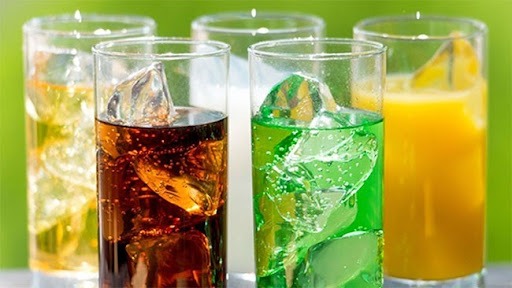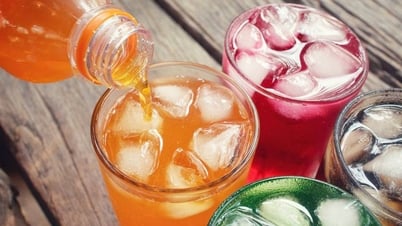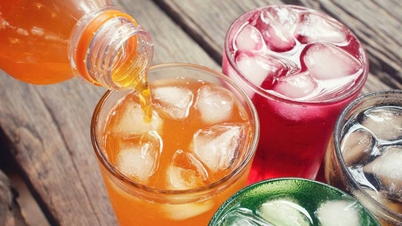Imposing special consumption tax on sugary drinks, including sugary soft drinks, is an important measure recommended by the World Health Organization for countries, including Vietnam.
It is necessary to impose special consumption tax on sugary drinks.
Imposing special consumption tax on sugary drinks, including sugary soft drinks, is an important measure recommended by the World Health Organization for countries, including Vietnam.
Major health consequences
In fact, in the disease model in Vietnam, non-communicable diseases are the leading cause of death, with an estimated average of 8 out of 10 people dying from non-communicable diseases.
 |
| Imposing special consumption tax on sugary drinks, including sugary soft drinks, is an important measure recommended by the World Health Organization for countries including Vietnam to reduce consumption and the harmful effects of sugary drinks on health. |
Associate Professor, Dr. Truong Tuyet Mai, Deputy Director of the Institute of Nutrition, said that sugary drinks are also the cause of at least 9 groups of diseases (risk of overweight and obesity, type 2 diabetes, metabolic syndrome, cardiovascular, urinary, digestive, gastrointestinal cancer, dementia, etc.).
Consumption of sugary drinks/sugary beverages has serious economic impacts, not only at the national level but also affecting many different groups of people.
According to research by the World Health Organization (WHO), consuming a lot of sugary drinks/soft drinks regularly is a cause of overweight and obesity. Liquid sugar in sugary drinks is absorbed so quickly that the body does not have time to register the amount of calories just consumed and send a full signal to the brain, so the body will continue to take in energy uncontrollably.
Therefore, the total calorie intake increases, leading to excess energy causing overweight and obesity, but lacking essential nutrients for the body because the energy from sugary drinks/sugary beverages is empty energy.
Adults who drink 1 can of soft drink per day for 1 year can gain up to 6.75 kg of weight (if energy intake from other food sources remains the same). Children who regularly drink a lot of sugary drinks are at risk of obesity > 2.57 times higher than children who do not drink.
High consumption of sugary drinks/soft drinks increases the risk of metabolic disorders and other non-communicable diseases. Sugars in sugary drinks/soft drinks change the body's metabolism, affecting insulin, cholesterol and metabolites, causing high blood pressure and inflammation. These changes to the body increase the risk of type 2 diabetes, cardiovascular disease, tooth decay, metabolic syndrome and liver disease.
For example, consuming sugary drinks/soft drinks increases the risk of type 2 diabetes. People who drink 354 - 704ml of sugary drinks/day have a risk of developing type 2 diabetes > 26% and a risk of developing other metabolic diseases > 20%.
Middle-aged men and women who drink one or more glasses of soft drinks per day have a 25% to 32% higher risk of developing prediabetes or diabetes and a nearly 45% higher risk of developing metabolic syndrome than those who do not drink.
Sugary drinks/soft drinks also increase the risk of cardiovascular disease. Men who drink 354 ml of sugary drinks/day have a risk of coronary heart disease or coronary heart disease death > 20%. Women who drink 708 ml of sugary drinks/day have a 40% higher risk of coronary heart disease or coronary heart disease death.
In addition, frequent and high consumption of sugary drinks/soft drinks increases the risk of high blood pressure > 1.36 times; increases the risk of gout in both men and women. Specifically, women who drink a can of sugary drink per day have a risk of gout > 75%. Men who drink 1 can of sugary drink per day have a risk of gout > 1.45 times, and drinking > 1 can per day has a risk > 1.85 times.
The risk of colorectal cancer is > 2 times higher in people who consume ≥ 708ml of sugary drinks/day. Also reduces fertility: Drinking ≥ 354ml of sugary drinks/day is associated with reduced fertility in both men and women.
Not to mention, frequent and high consumption of sugary drinks/soft drinks is the main cause of tooth decay and oral diseases, negatively affecting bone health. More dangerously, consuming a lot of sugary drinks/soft drinks increases the risk of death due to cardiovascular disease and cancer or any other cause.
Special consumption tax should be imposed on sugary drinks/soft drinks.
With the disease burden caused by sugary drinks/soft drinks as mentioned above, according to many experts, Vietnam needs to impose special consumption tax on this product to reduce consumption, reduce the disease burden on people, and reduce medical treatment costs.
Around the world, many countries also apply excise tax on sugary drinks because it brings three benefits, including improving public health; increasing revenue for the state budget; and helping to reduce health care costs for related diseases and reduce long-term labor productivity losses.
As of August 2023, 117 countries had imposed taxes on sugary drinks, of which 104 had imposed excise taxes. Evidence from regions that have implemented excise taxes on sugary drinks shows a significant reduction in sugary drink consumption compared to regions that have not.
Ms. Dinh Thi Thuy, Deputy Director of the Legal Department, Ministry of Health, shared: Imposing special consumption tax on sugary drinks can increase the budget from 5,300 - 17,350 billion VND depending on the tax mechanism and tax rate.
Revenues from sugary drinks/soft drinks taxes can be reinvested in public health improvement programs such as subsidies for infrastructure, drinking water, support for healthy school meals or providing financial funds for health communication campaigns. At the same time, it helps increase spending on health care activities, social programs and implementation of economic recovery projects after Covid-19.
Research by the University of Public Health has shown that if a 20% excise tax is applied to the retail price of sugary drinks, the rates of overweight and obesity could decrease by 2.1% and 1.5%, respectively.
With many people wondering today whether imposing excise tax on sugary drinks/soft drinks will reduce jobs in the beverage industry?
According to analysis by some experts, special consumption tax on sugary drinks increases retail prices leading to reduced consumption of these products but there is no evidence of a link with job losses in the beverage industry.
According to the report "Financial tools to reduce sugary beverage consumption in Vietnam" published by WHO in 2018, the phenomenon of job reduction in the beverage industry often comes from the industry's investment in modern industrialization chains, because in reality, there are not many jobs in the beverage industry because the level of industrialization of the production chain is very high.
Taxing sugary drinks reduces the purchasing power of sugary drinks that are subject to the tax, but the beverage industry also supplies many other types of drinks to the market that are not subject to the special consumption tax and there is no evidence that imposing this tax will reduce the purchasing power of those types of drinks.
There is also no evidence of a reduction in beverage industry revenues, especially as the purchase of healthier drinks (like water) will increase when sugary drinks are taxed and this will create alternative jobs.
Taxing sugary drinks increases sales of untaxed healthy drinks and creates an incentive for manufacturers to reformulate their products to reduce sugar content.
While this process may take time, when it is done it will save jobs and the increased consumption of the new product will offset the reduction in higher sugar drinks.
This will make up for lost sales of sugary drinks. Many areas that have imposed sugary drink taxes have seen growth in overall sales and revenue for beverage manufacturers, despite falling sales of sugary drinks.
Studies from the US, Mexico and the UK show no job losses in the beverage manufacturing or food retail industries, and no other negative economic impacts following the introduction of sugary drink taxes.
In Berkeley, California, retail food sales did not decrease after imposing a sugary beverage tax, and employment in the food industry increased by 7% between July 2014 and June 2016, 15 months after the tax was implemented.
Evaluations of the sugary beverage tax in Philadelphia's (Pennsylvania, USA) city after 1 and 2.5 years of implementation did not record any significant changes in unemployment in the supermarket, soft drink manufacturing, and related industries after imposing the sugary beverage tax compared to neighboring counties that did not impose a sugary beverage tax.
Research modeling the impact of a sugary beverage tax of 20% to 50% in Brazil also found that the tax would increase GDP and create between 69,000 and 200,000 jobs, depending on the tax rate.
Models simulating the impact of a 20% sugary beverage tax in Illinois and California show that implementing the tax would lead to net job gains in both states.
Research on the impact of a law in Chile that reduced sugary drink purchases by 24.7% also found no reduction in employment.
In Mexico, the reduction in employment occurred mainly during the modernization period when the beverage industry increased its investment in machinery and modernization. Since the tax increase, employment has not changed.
A study modeling the impact of a sugary drinks tax of 20% to 50% in Brazil also found that the tax would increase gross domestic product by R$2.4 billion ($460 million) to R$3.8 billion ($736 million) and would create between 69,000 and 200,000 jobs, depending on the tax rate.
Taxing sugary drinks/soft drinks would save current and future resources for households and society and would likely create new jobs.
In Vietnam, sugary beverage consumption has increased sharply in recent years. Total sugary beverage consumption has increased rapidly from 1.59 billion liters in 2009 to 6.67 billion liters in 2023 (an increase of 420%). Per capita consumption has also increased rapidly, from 18.5 liters/person in 2009 to 66.5 liters/person in 2023 (an increase of 350%). Between 2002 and 2016, carbonated beverage consumption tripled, sports drinks and energy drinks increased 9 times, and instant tea/coffee products increased 6 times.
Source: https://baodautu.vn/can-thiet-ap-thue-tieu-thu-dac-biet-voi-do-uong-co-duong-d228009.html



![[Photo] General Secretary To Lam, Secretary of the Central Military Commission attends the 12th Party Congress of the Army](https://vphoto.vietnam.vn/thumb/1200x675/vietnam/resource/IMAGE/2025/9/30/9b63aaa37ddb472ead84e3870a8ae825)
![[Photo] Solemn opening of the 12th Military Party Congress for the 2025-2030 term](https://vphoto.vietnam.vn/thumb/1200x675/vietnam/resource/IMAGE/2025/9/30/2cd383b3130d41a1a4b5ace0d5eb989d)
![[Photo] Panorama of the cable-stayed bridge, the final bottleneck of the Ben Luc-Long Thanh expressway](https://vphoto.vietnam.vn/thumb/1200x675/vietnam/resource/IMAGE/2025/9/30/391fdf21025541d6b2f092e49a17243f)
![[Photo] President Luong Cuong receives President of the Cuban National Assembly Esteban Lazo Hernandez](https://vphoto.vietnam.vn/thumb/1200x675/vietnam/resource/IMAGE/2025/9/30/4d38932911c24f6ea1936252bd5427fa)
![[Photo] The 1st Congress of Phu Tho Provincial Party Committee, term 2025-2030](https://vphoto.vietnam.vn/thumb/1200x675/vietnam/resource/IMAGE/2025/9/30/1507da06216649bba8a1ce6251816820)






























































































Comment (0)